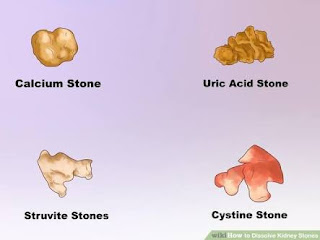Kidney stones, or renal calculi, are solid masses made of crystals. Kidney stones usually originate in your kidneys, but can develop anywhere along your urinary tract. The urinary tract includes the kidneys, ureters, bladder, and urethra.
Kidney stones are known to be one of the most painful medical conditions. The causes of kidney stones vary according to the type of stone.
Types of Kidney Stones
Not all kidney stones are made up of the same crystals. The different types of kidney stones include:
Calcium
Calcium stones are the most common. They can be made of calcium oxalate (most common), phosphate, or maleate. Eating fewer oxalate-rich foods can reduce your risk of developing this type of stone. High-oxalate foods include potato chips, peanuts, chocolate, beets, and spinach.
Uric Acid
This type of kidney stone is more common in men than in women. They can occur in people with gout or those going through chemotherapy. This type of stone develops when urine is too acidic. A diet rich in purines can increase urine’s acidic level. Purine is a colorless substance in animal proteins, such as fish, shellfish, and meats.
Struvite
This type of stone is found mostly in women with urinary tract infections. These stones can be large and cause urinary obstruction. These stones are caused by a kidney infection. Treating an underlying infection can prevent the development of struvite stones.
Cystine
Cystine stones are rare. They occur in both men and women who have the genetic disorder cystinuria. With this type of stone, cystine — an acid that occurs naturally in the body — leaks from the kidneys into the urine.
http://cancercareclinic.in/





